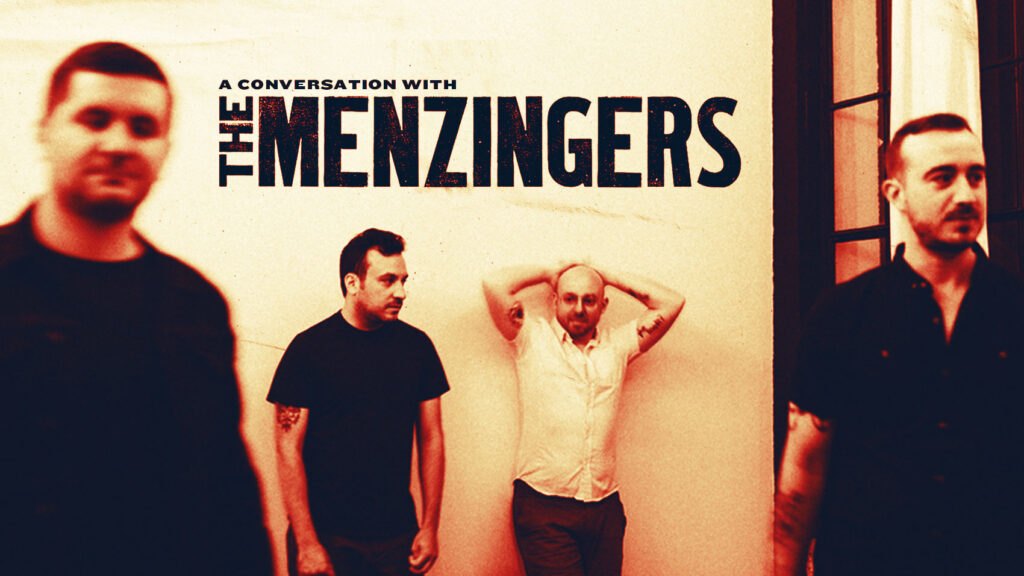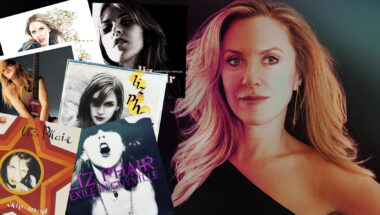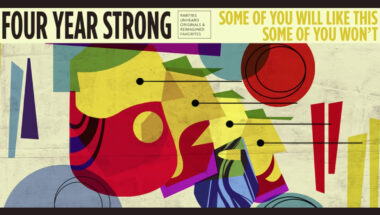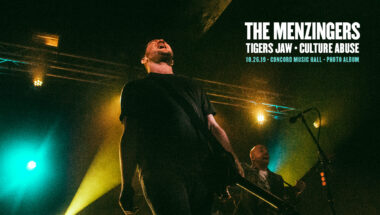Two years ago, you’d be hard pressed to find The Menzingers in a less-than-celebratory mood. The release of After The Party in 2017 was a massive success for the Scranton scrappers, a reflection on maturing and an ode to their twenties that landed the record on many critics’ best-of lists for the year.
But what really happens after the party? That question feels even more front and center than before with the release The Menzingers’ new record Hello Exile. Yes, the album clearly expands the band’s sound into fresh territory, inspired by the singer-songwriter Americana greats. But it also takes swing at some familiar subject material—hometowns, past relationships substance abuse—through a more truthful lens. Without calling it the “mature” Menzingers record, there’s no doubt the band is flexing their most honest songwriting to date.
Greg Barnett was nice enough to make a quick phone call to Riot Fest ahead of the band’s headlining show at Concord Music Hall this Saturday reflecting on Hello Exile post-release, pointing out the literary references you may have missed, and more. Dig in.
RIOT FEST: The songwriting on Hello Exile is clearly a step towards something a little different. I hear a lot of nods to country, a lot of nods to classic rock, Americana-type stuff. What artists led you to experiment with the Menzingers formula on Hello Exile?
GREG BARNETT: Well, we kind of always had listened to those types of artists when we first started the band. The only tapes we had in the van were like, CCR, Tom Petty, Springsteen, The Police… things like that we would drive around the country and listen to. That was definitely very telling of the type of band that we were, and the direction that we hoped to one day go. For this album we really fell in love with songwriting and the idea of how powerful a well constructed song is.
I think some of the best songs ever written were by people like Tom Petty, Springsteen… those types of artists we grew up on. And we definitely wanted to let that come across more so than we have in the past, diving more into country. You know, that was something that I’m very much into: singer-songwriter style music. It was an element that I wanted to bring to the band—I know everybody else kind of has their love affair with that as well. We wanted to incorporate that with what we’ve always done, but change it up in a way that just felt real and honest to who we are and what we want to be as musicians going into our sixth album.
Did it feel like a choice to lean into some new territory for Hello Exile? Or has it felt more like a gradual change over time?
Definitely wasn’t a choice, it was just natural. It was just what became of the songs. There was never any type of discussion that four of sat down and said, “Hey, we want to experiment with our sound a little bit.” It was just what we felt comfortable writing and what was inspiring to us. And I think that that’s kind of—at least me, and I think to others, is why it feels very natural. It feels very honest because it’s not forced, you know? It’s just something that’s always been there. We’ve always had this storytelling aspect to our songwriting, and this time we just kind of went a little bit more wild with it and really dove into it.
I think that if we were to try to write, say, big endemic, fast, punk rock songs—maybe that we did on, say, Chamberlain Waits or something along that line—I think that would be more challenging for us in that sense. It wouldn’t feel necessarily honest. It would be more so that we’re trying to do something then to actually let it come out naturally.
Is that kind of honestly difficult? Are there ever tracks you’re afraid to put out—whether it’s lyrical content, or just for sounding really different?
Absolutely. And I think on this record more so than ever. The songs are, you know, very personal and very emotional in that regard, and to put them out and to have thousands and thousands of people hear them is very nerve wracking. It’s very scary—it’s funny in the sense that I’m not a person that really reveals that much about myself and my feelings if you know me. And as a person I’m not really not that type of heart-on-your-sleeve type person. But it definitely comes through in the songwriting.
And, uh… while I’m writing the lyrics to these songs, I don’t necessarily think of how I gotta actually sing these songs live in front of people—and that people are going to hear them—until it actually happens. [Laughs] I have to kind of deal with the repercussions of it, which is kind of funny. It can definitely be difficult, but I guess that’s kind of the job I signed up for. [Laughs]
“America (You’re Freaking Me Out)” is likely one of those songs. It felt bold as track one on the record. It’s always tricky to fit some sort of political message into a three-and-a-half minute song. What made you guys feel like it should be the first track?
So, that song in particular: We started writing the album September of 2018. The rough skeleton of that idea of that song lasted very… it took us a very long time to write the song. We went through so many different phases of it. At first I wasn’t writing it as a political song, and then I started to throw some lines in there, and I [thought], “I need to completely rewrite this.” I’ve always been inspired [by] protest music, political music, and it’s something that I felt was really important to say what’s been on my mind—I mean, all or our minds, the four of us.
As we were writing it, it became very apparent that it had to be the first song on the album. It felt like if we didn’t put it the first song on the album, we’d be kind of hiding from it, and it wouldn’t be as much of a statement as it needed to be. We wanted it to be bold and in your face, and it’d be the first thing you’d hear. I think that if it was track four, or three, or ten, it wouldn’t have the same effect that we wanted it to have. To us it was very important to start off the album like that, because this is the stuff that’s on everybody’s minds. It just seemed that we were hiding from these ideas and the things that we believe in.
The lyrics came very slow and I changed up into the day that we were in the studio. But a couple months into writing, that’s when I got the chorus down. And then right when the chorus was locked in, we all kind of looked at each other and we said, “Okay. This is gonna be the first song on the album. This is what we’re doing.” I’m really glad that the song came out the way that it did, but also that it’s kind of a big statement piece for the album.
Another thought I had listening through Hello Exile: your discography, given how young you guys started, has unintentionally led most of your fans through adolescence into adulthood. I’ve seen the word “mature” thrown around a lot describing the new record. Like, “This is the mature Menzingers record.” I can definitely hear in tracks like “High School Friend”—your chorus ponders where the good times went.
The whole idea of the song is about two people talking about old times, but in the lyrics I’m telling tales of revisionist history. You know how when you’re embellishing the stories from your past, they always sound so much better than are? The song “High School Friend” was, in particular, about two people thinking about a time in their lives that, in reality when they lived through it, they hated it. I hated going through high school! It was awful. I had no freedom, I lived in a small, conservative town, and I didn’t fit in the way that I wanted with the world that I wanted to. I wanted to live in a city. I wanted to experience life. I wanted to escape that. The idea of the song a play off revising your past and the way that you choose to remember it. I wanted to use that song as a kind of statement about two people longing for things that weren’t actually that great.
My childhood pal Mario and I do this a lot—talk about what was so great 10 years ago, and then have a realization of, “Wait a second. We had dial up internet! It took an hour to look up something.”
[Laughs] Exactly. I think the idea more so of the song is, with the line, “Wondering where all the good times went,” is more of wondering where the innocence went.
Where did the title Hello Exile come from?
So, to start off with… I have this giant book on my nightstand for when I need help falling asleep, it’s about a thousand pages: a Napoleon Bonaparte biography. It really works wonders—read 10 pages and it puts you right out. [Laughs] If you’re not familiar, Napoleon was exiled twice. He actually was exiled to Elba, and then he escaped, and then raised his army again, and then they exiled him again to the island of Saint Helena. He hoped to go to America, but they sent him to Saint Helena.
For some reason—I guess in my subconscious mind—that idea of exile stuck with me when I was falling asleep, and it just started leaking into songs. The first song we wrote for the album was “Strangers Forever,” and a lot of the lyrics have imagery of deserted islands, being stuck on an island alone with yourself and feeling isolated from everyone. Those themes kept coming up a lot. It came up with struggling with alcohol with “I Can’t Stop Drinking,” how isolating that can be and how lonely dealing with that can be. That was another one of the first songs we wrote.
Then we started writing the song “Hello Exile,” and that’s where the theme of the album started to come into place. At the time I was reading this short story by Anton Chekhov called The Lady with the Dog. The story’s about two people that meet, they’re both in other relationships, and they go and they meet in this little vacation town. They fall for each other, but then they have to go back to their lives and have to reconcile with the idea of being in love with somebody and being away from them. I was drawn to that—it made me really think about my childhood growing up in this small town, which was essentially a vacation town. Kind of like a retirement community in a sense. [Laughs] I thought about how they were always constantly coming and going, and how isolated I felt growing up in this tiny conservative town that I don’t necessarily think I really fit in with.
With that, I kind of went back to when I wrote the lyrics to “Hello Exile” and that mindset of being isolated, and it became a prevalent theme through the rest of the songs. That’s kind of where the title came from. It’s kind of a two-parter: In a negative sense, it’s this acceptance of greeting this exile in your life. In a positive sense—we always wanted to keep it kind of positive sounding—it’s a changing point in your life, it’s something where you can start fresh and start new.
I was one of those isolated small town folks too—I’m sure you hear that from a million people.
[Laughs] Yeah. I may come off as harsh when I talk about my hometown, but I absolutely love it. I guess maybe that’s why I’m being hard on it. I loved being able to grow up where I did. I loved the people that I met. I loved meeting people that thought the exact opposite of what I thought, you know? I’ll have it in me for the rest of my life, that small town mentality. I really love where I came from. But it’s also pretty complicated in that sense as well, and I think there’s a lot on this album that is reconciling those complications.
Do you have a favorite song on the record?
It’s one of those things that’s always changing for me, I like songs for their own specific reasons. I like “High School Friend” for how personal it is to me. A lot of people are able to relate to that song, but in a way it feels so incredibly personal that it can only be related to me and my friends.
I love “America (You’re Freaking Me Out)” for how big of a political punk rock song it became and how proud of it I am. I love “I Can’t Stop Drinking” because I feel like it’s just so brutally honest—it was a song that I was afraid to release for a long time. I’m glad that it came out the way that it did. “Farewell Youth” sums up a lot of my ideas and fears and anxiety of losing friends and my relationships with them.
“Last To Know,” musically and lyrically, is one of my favorites. It’s my favorite song that Tom sings on the album, and I just love it so much. It feels so different for us. I have such fond memories of everything clicking and getting goosebumps, hearing Tom singing acapella at that first cut out, how magical that was. I have a lot of really fond memories to these songs, so I can’t I say particularly have one.
You’ve done a fair share of promotion ahead of the album, but now the record’s been out for two weeks. How are you feeling post-release?
Honestly, it’s been absolutely amazing. The amount of support we’ve had for this album has been crazy. We got to do these in-store performances and meet all these people that were hearing the album for the first time, and hearing people connect with these songs that we’ve been working on now for so long—and how much it means to them—has been incredible. The amount of my nerdy songwriter friends that texted me and talked about how much they loved the songwriting, and how much they loved the lyrics… that stuff means the world to me.
We worked really, really hard on it. The album completely consumed our lives more so than any album we’ve ever worked on. To see that work pay off is extremely gratifying.
Chicagoans can catch The Menzingers performing at Concord Music Hall this Saturday, October 26. Tickets are on sale now.



